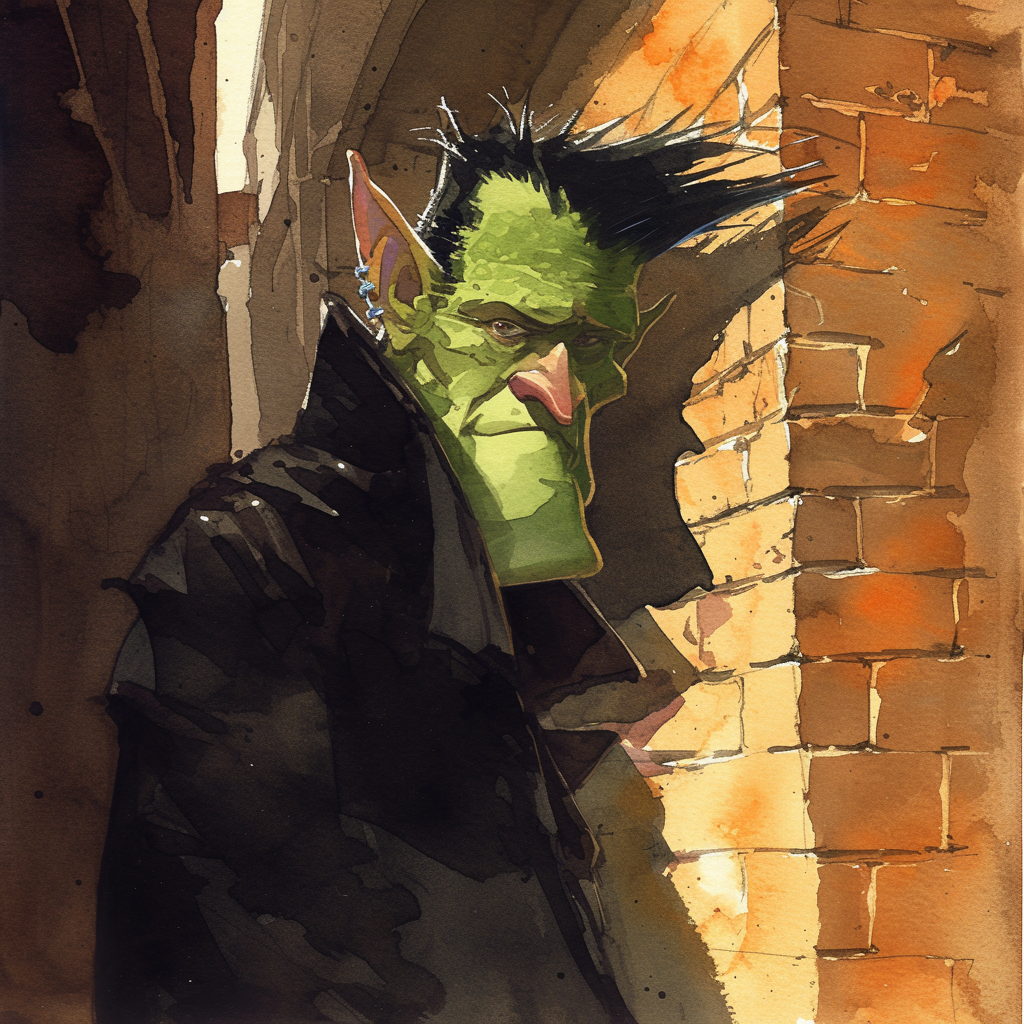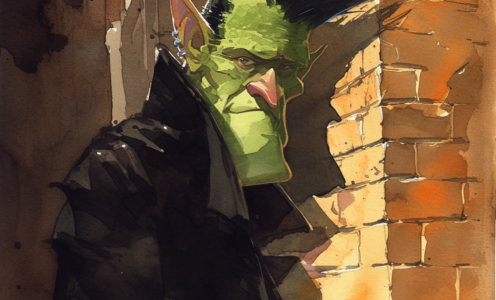The Politics of Anarchy
Philosophy by Numbers: The Hands of Havoc
Carcerian Juan [not his real name] speaks of the Politics of Anarchy
‘Anarchy’ is something of a dirty word these days in the Cage, used by Hardheads to denote anything that’s against their creed, and Guvners to mean anyone who disagrees with their Laws. But it ain’t like that, cutter. Anarchism is as much a philosophy as anything the Lawbringers could muster, and anarchists are as valid a bunch of thinkers as the most ardent Signers. It’s just that we’re…sorry…they’re misunderstood. Let me explain, if you will. There ain’t any Hardheads listening in, are there?
The main thrust of the anarchism argument is that governments and their laws are an anathema to liberty. The state—for our purposes primarily the three law-making and keeping factions in the Cage, though all the factions have their sticky fingers in the process to some extent—has arrogated itself as the decision maker for us, the plebs. The state is the sole legitimate user of violence. For example, I couldn’t walk into the Great Bazaar and bash a few heads without getting scragged by the Hardheads, who would in turn thrash the daylights out of me before they arrested me. Then I’d be dragged before some stuffy old Guvner who’d sentence me, and push me off to the Red Death who’d get their kicks punishing me.
“Yeah? Well, that’s the way the system works,” you cry. “Don’t go breaking heads unless you’re prepared to let others do the same to you.”
Fair enough, I say. But what about the Hardheads that beat me, or the Mercykillers that pulled out my fingernails and burned holes in my tongue (why else do you think I talk like this?) They seem to be able to commit whatever acts of random violence they wish, and not suffer the consequences.
“Oh sure,” you say. “That’s terribly unfair on poor old you. But if you hadn’t committed the crime then you’d never have had to be punished. Stop sodding whining and start doing something constructive.”
Fair enough, I say again. I too wish for a better society where things are fair and just. Anarchy ain’t about misery. But before we dismiss this whole topic out of hand, let’s just look at the details one last time…
We have a state that has proclaimed itself legitimate to make decisions. It recognises no limit on its decision-making power, though in practice it does devolve some limited decision making to individuals (so-called discretion of the watch officer, or the benefit of the doubt that a judge might give on a good day). However, the state reserves the right to, at any time, assume complete control over any and all devolved decision making. That might happen when a direct decree from the factol descends and overrides any discretion the Hardhead officers might usually have.
It may seem that there is some level of democracy in the decision making (as in the Sigil Council of the Factions, or the occasional faction which allows its members a vote when new Factols are chosen), this simply appears to be so much pantomime to disguise the true operation of power, and more fool you if you believe it!
Some bloods’ll tell you that we fight for the freedom to do as we like.
—Dalboc of the Nine Shadows, Anarchist priest of Lochost, explaining the dark of things to a clueless
And I’ll tell you that they’re sodding addle-coves.
The dark of it is we’re fighting for the freedom to believe as we like.
And here on the planes, berk, that’s a whole lot more important.

Listen cutter, so long as we are subjected to the authority of states, be they factions, monarchies, republics, aristocracies or anything you’d care to think of, no matter what pious words any “constitution” or “treaty” may contain, we have in fact no inalienable rights, only those rights which have been loaned to us by the state. Remember, the state can create and remove any laws it so wishes at any time…
Shall we be allowed to protest in public over policies with which we disagree?
Only if it pleases the state that we shall.
Shall we be allowed to publicly profess some belief as to the nature of the powers? Shall we be allowed to express out sexuality or marry whom we choose? Shall we go where we please and say as we wish?
Only if it pleases the state.
All of this behaviour on the part of the state is surely antithetical to the operation of reason and liberty. Left to their own devices, people are capable of choosing correctly in all matters relating to the running of their lives. If they do not always choose correctly, at present, this is because they have been twisted by the operation of the state.
The state’s self-declared rule that itself is the only legitimate user of violence shows that it has a bite to enforce its bark. It denies people the right to use violence except by its sanction, and of course, it ever sanctions the use of violence against itself — this it calls treason or sedition, or civil war, or if it wishes to discredit these acts, criminality.
In effect, the state has hijacked society by allowing it only a limited amount of choice. Consequently, the only possible way to behave in an anti-state fashion is to be antisocial. If the state makes choice a crime then choosing in favour of a life of crime is doubly to oppose the state, by choosing to do only the things it forbids.
Though I am of course not one of them, I know that one cell of anarchists (led by a brave philosopher-anarchist called Bakunin) calls for just this: He proclaims that anarchists should “commit random acts of violence and seek the company of only those who are rough to the point of cruelty, but whose nature is fresh and strong, unsubdued and inexhaustible.” That is; those who have already chosen against the state by choosing lives of crime. Amongst this number are tanar’ri, the more evilly inclined Xaositects, some Sinkers and numerous petty thief gangs of the Hive.
Of course, some laws are not bad in themselves. Some enshrine moral principles which all people of good would surely want to see recognised even after the fall of the state—murder or rape, for example. These are actions which ought always to be recognised as wrong, and should never have been made ‘illegal’, since nobody of sound mind would wish to commit them. These crimes have been lumped together with the non-crimes by the state, even though so-called ‘political crime’ is not in fact wrong at all.
By attacking the state through society in the short term allows us to reorder society in the long term, to make political ‘crimes’ legal and retain criminal crimes as punishable, by whatever system is in force. This cannot be done until the rigid and corrupt hierarchy of the state is swept away, however, for until there is no state, the state will always seek to protect itself by punishing non-criminal crime.
The anarchist-philosopher must harness the power of these criminal elements to disrupt and destabilise society. Increasing social entropy (there’s a term that’s cause Sinkers to prick up their ears) by classical terrorism and guerrilla tactics, smashing shop fronts, theft, magical vandalism and so on (here we might be able to enlist the aid of Xaositect elements and the ubiquitous Doomguard…little do they realise they too must be swept away to stop the rot), and the the radical rebirth of a new, stateless society is the way forward.
Julius the Symmetrical, Contrary Philosopher, responds…
“Your ends are all very noble, my friend, but so like many philosophers of anarchy, you do not consider the means you use. The “use a tanar’ri to catch a tanar’ri” approach never did work to any great extent. When social order is reestablished in your “ideal society”, what happens to the criminals who by now are enjoying their positions of power? Hardened criminals, tanar’ri, Sinkers and the like will be keen on holding onto their status. They can make laws that benefit themselves, for example. And will your bunch of high-minded anarchists be able to stop them? With the aid of whose army? It makes little sense then, for anarchists to welcome antisocial behaviour when it arises, or rioting, or war…
“If people are to take the moral and political responsibility for their own actions, alliances with the criminally immoral and irresponsible will not help them.”
Further Reading: Philosophy Now, Issue 16, Anarchist or Antichrist, by David Limond
Source: Jon Winter-Holt


